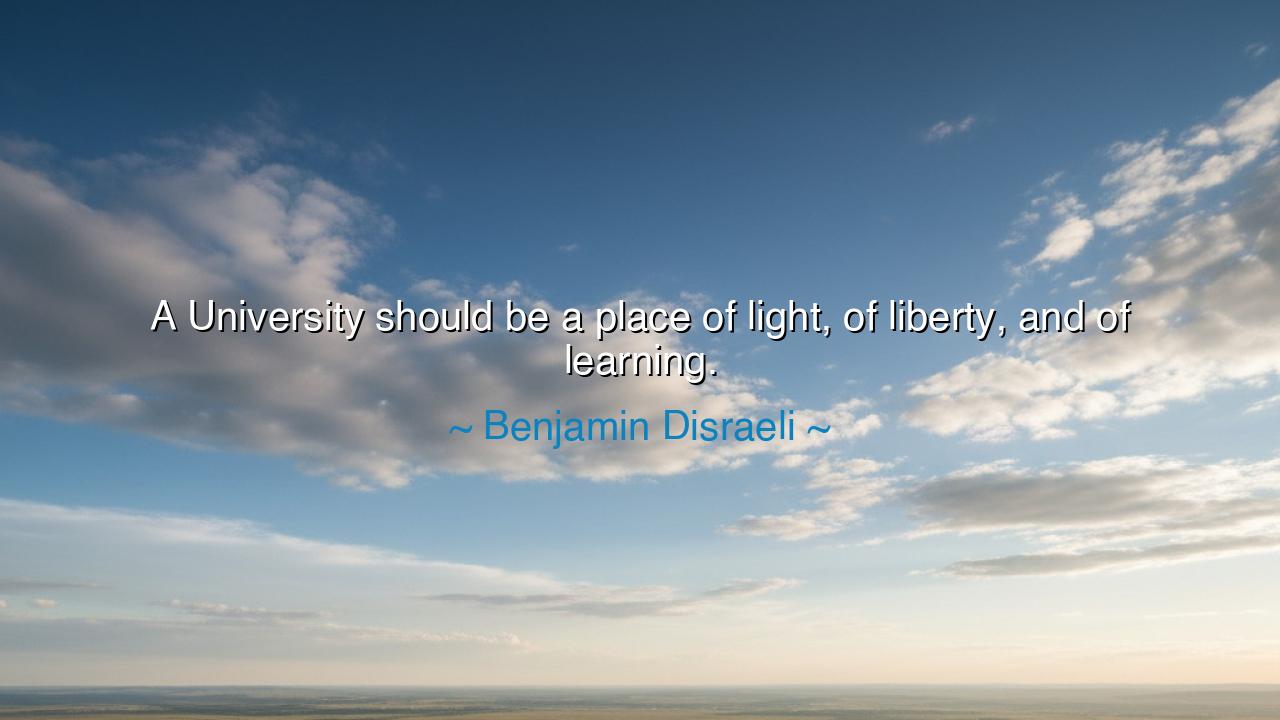
A University should be a place of light, of liberty, and of






“A University should be a place of light, of liberty, and of learning,” declared Benjamin Disraeli, the statesman, orator, and thinker who shaped the destiny of nations through the force of intellect and imagination. In this noble utterance, he captures the sacred trinity of what true education must be — light for the mind, liberty for the soul, and learning for the advancement of humankind. His words stand not merely as a vision for universities, but as a call to all who seek wisdom: that knowledge divorced from freedom and moral illumination is barren, and freedom without knowledge is blind.
To call a university a place of light is to proclaim that it must illuminate the darkness of ignorance. Light, since the dawn of time, has been the symbol of truth — the flame Prometheus stole from the gods to give mankind reason and self-awareness. In Disraeli’s vision, the university is a new Prometheus, carrying this sacred fire forward. Its purpose is not simply to instruct, but to enlighten — to awaken curiosity, to ignite thought, to dispel the shadows of prejudice and fear. The halls of learning must not echo with the dogmas of the past, but shine with the radiance of inquiry. For where truth is sought earnestly, there is light — and where light shines, progress follows.
But light alone is not enough. Disraeli calls also for liberty, for knowledge can flourish only in the soil of freedom. A university, in his wisdom, must be a sanctuary where minds are free to question, where voices are not silenced by conformity or fear. Liberty in learning is not rebellion for its own sake — it is the courage to pursue truth wherever it leads, even into uncomfortable places. The great thinkers of every age — from Galileo, who defied the blindness of his time, to John Stuart Mill, who defended the freedom of thought — have shown that learning without liberty becomes indoctrination. The university, therefore, must stand as a fortress of the human spirit — protecting the right to doubt, to reason, and to dream.
And yet, these two — light and liberty — would mean little without the third: learning itself, the discipline of the mind and the labor of the heart. True learning, as Disraeli saw it, is not the memorization of facts, but the cultivation of wisdom — the union of intellect with virtue. It is learning that tempers ambition with humility, knowledge with compassion, power with responsibility. In this, the university becomes not merely a workshop for professions, but a forge of character, where souls are strengthened as much as minds are sharpened.
Consider the example of Oxford University, whose centuries-old tradition of scholarship inspired Disraeli himself. In the cloisters and libraries of that venerable place, the world has seen the birth of ideas that reshaped civilization — from the philosophy of John Locke, who defended liberty of conscience, to the scientific genius of Isaac Newton, who revealed the laws of creation. Yet Oxford’s true greatness lay not only in its achievements, but in the spirit it cultivated: a reverence for truth, a respect for discourse, a belief that learning is both the right and the duty of every generation. Disraeli’s words were born from that heritage — a tribute to the enduring role of education as the moral and intellectual heart of society.
His quote also carries a warning, subtle but profound. When the university ceases to be a place of light, ignorance returns; when it loses liberty, truth is silenced; and when it abandons learning, it becomes hollow — a house of titles rather than understanding. The strength of any nation lies not in its armies or its riches, but in the light of its schools, the freedom of its thinkers, and the wisdom of its youth. Thus, to neglect education is to dim the lamps of civilization itself.
Let this teaching, then, be carried into the hearts of all who learn and all who teach: wherever knowledge is pursued with humility, freedom, and passion, there stands a true university, whether in a grand hall or beneath a humble tree. Keep your mind ever seeking the light of truth, guard your liberty to question and speak, and dedicate yourself to the lifelong learning that transforms not only the intellect, but the soul. For these three — light, liberty, and learning — are not merely the pillars of education, but the pillars of life itself.
And so, let the spirit of Benjamin Disraeli’s wisdom burn within you: to study not only for success, but for illumination; to think not only for yourself, but for the freedom of others; and to learn not merely to know, but to understand. In doing so, you will make your own life a university of the soul — a living place of light, of liberty, and of learning, where the flame of truth will never die.






AAdministratorAdministrator
Welcome, honored guests. Please leave a comment, we will respond soon